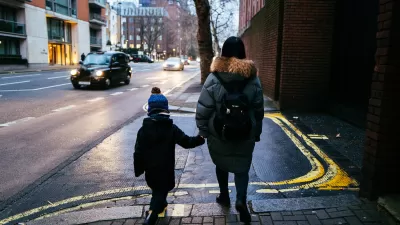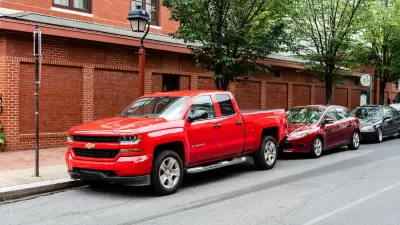Global SUV ownership is skyrocketing, with consequences for carbon emissions and traffic safety. A few voices are now calling for bans on the large vehicles.

More and more drivers around the world are opting for SUVs. Over the last decade, an analysis by the International Energy Agency found that the vehicles "contributed more to the increase in global CO2 emissions than airlines, trucks, or heavy industry," Adele Peters reports.
On top of the carbon costs, SUVs are also more likely than smaller vehicles to kill pedestrians and other drivers. "When an SUV hits a pedestrian, that person is more than twice as likely to die than if they had been hit with a smaller car. An investigation last year found that SUVs are a leading reason why pedestrian deaths in the U.S. increased 46% between 2009 and 2018," Peters writes.
The downsides of the worldwide SUV craze came into bitter relief this September when a collision in Berlin killed four people, sparking protests at the Frankfurt Auto Show. The outcry led a local district mayor to argue against allowing SUVs in cities, and the theme was taken up by a German parliamentary leader who argued for size restrictions.
Peters notes that transitioning to electric SUV fleets might solve the immediate emissions problem, but only partially offsets the carbon impact unless power grids are fully renewable. She also points out the following: "California—and several other localities—technically have a law on the book that allows cities to set a weight limit for vehicles on its roads, which many newer, larger SUVs exceed. The laws are largely unenforced, but could that change?"
FULL STORY: Should we outlaw SUVs?

Maui's Vacation Rental Debate Turns Ugly
Verbal attacks, misinformation campaigns and fistfights plague a high-stakes debate to convert thousands of vacation rentals into long-term housing.

Planetizen Federal Action Tracker
A weekly monitor of how Trump’s orders and actions are impacting planners and planning in America.

In Urban Planning, AI Prompting Could be the New Design Thinking
Creativity has long been key to great urban design. What if we see AI as our new creative partner?

King County Supportive Housing Program Offers Hope for Unhoused Residents
The county is taking a ‘Housing First’ approach that prioritizes getting people into housing, then offering wraparound supportive services.

Researchers Use AI to Get Clearer Picture of US Housing
Analysts are using artificial intelligence to supercharge their research by allowing them to comb through data faster. Though these AI tools can be error prone, they save time and housing researchers are optimistic about the future.

Making Shared Micromobility More Inclusive
Cities and shared mobility system operators can do more to include people with disabilities in planning and operations, per a new report.
Urban Design for Planners 1: Software Tools
This six-course series explores essential urban design concepts using open source software and equips planners with the tools they need to participate fully in the urban design process.
Planning for Universal Design
Learn the tools for implementing Universal Design in planning regulations.
planning NEXT
Appalachian Highlands Housing Partners
Mpact (founded as Rail~Volution)
City of Camden Redevelopment Agency
City of Astoria
City of Portland
City of Laramie





























